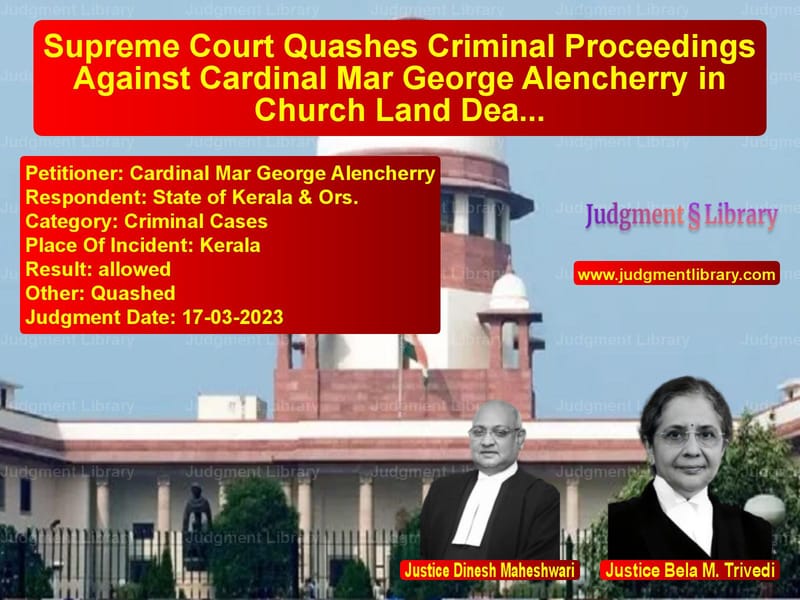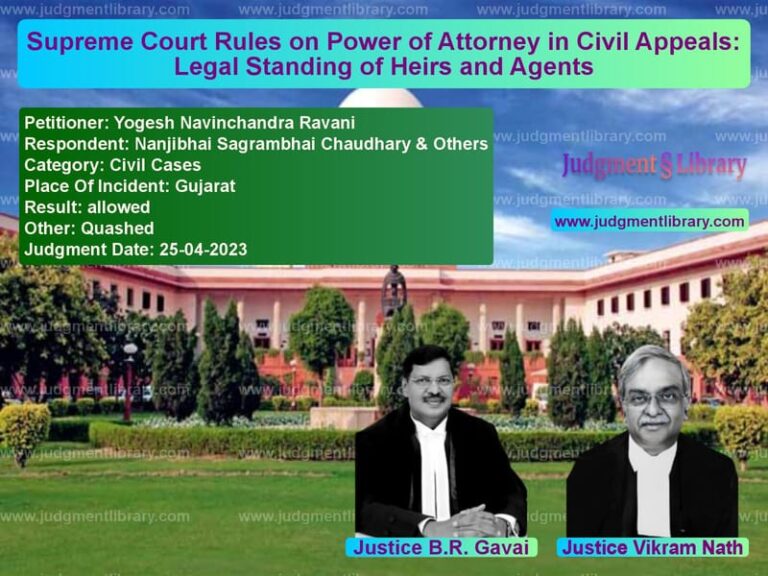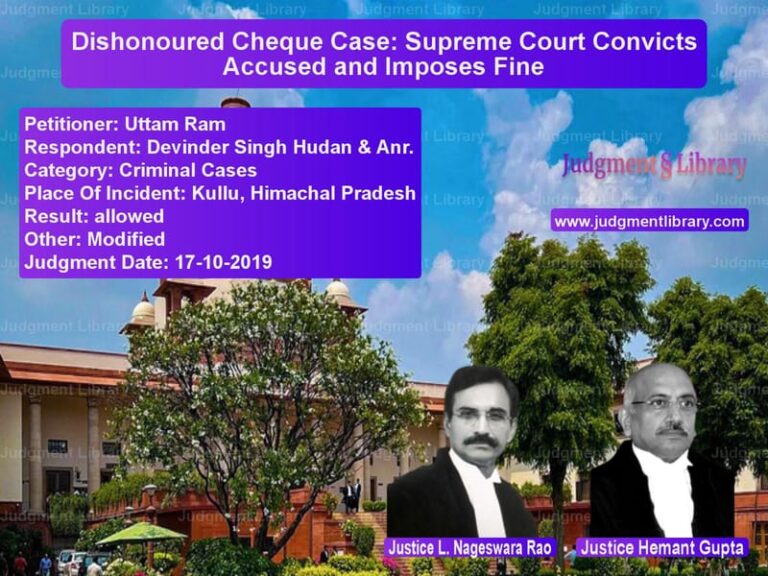Supreme Court Quashes Criminal Proceedings Against Cardinal Mar George Alencherry in Church Land Deal Case
The case of Cardinal Mar George Alencherry v. State of Kerala & Ors. revolves around allegations of misappropriation and criminal conspiracy concerning the sale of church-owned land. The Supreme Court was tasked with determining whether the criminal proceedings initiated against the Cardinal and other accused individuals should be quashed, given the nature of the allegations and the procedural lapses in the case.
The Supreme Court ultimately quashed the criminal proceedings, holding that the complaints lacked substantive evidence of criminal intent and that the High Court had exceeded its jurisdiction by making unwarranted observations beyond the scope of the case. The ruling clarifies the limits of judicial activism and reinforces the principles of procedural fairness in criminal cases.
Background of the Case
The dispute arose when a complaint was filed against Cardinal Mar George Alencherry and others, alleging that they had fraudulently alienated land belonging to the Archdiocese of Ernakulam-Angamaly. The complainant, Joshy Varghese, claimed that the Cardinal had conspired with other church officials to sell immovable properties at undervalued rates, causing financial loss to the Archdiocese.
The allegations led to the registration of multiple criminal cases under Sections 120B, 406, 409, 418, 420, 423, 465, 467, 468 read with Section 34 of the Indian Penal Code (IPC). The trial court issued summons against the accused based on the complaint.
The accused challenged the summons and sought quashing of the criminal proceedings before the Kerala High Court. The High Court dismissed the petitions and directed further investigation into church land transactions, prompting the accused to approach the Supreme Court.
Arguments by the Parties
Arguments by the Petitioner (Cardinal Mar George Alencherry)
- The petitioner contended that the transactions were conducted as per church regulations and were approved by the Archdiocesan authorities.
- The complaint was politically motivated and aimed at defaming the petitioner.
- The alleged offenses did not constitute criminal breach of trust or fraud, as they pertained to internal church administration.
- The High Court had overstepped its jurisdiction by making unwarranted observations on the spiritual and temporal affairs of the church.
- The petitioner had already faced multiple complaints on the same issue, some of which had been dismissed.
Arguments by the Respondents (State of Kerala & Others)
- The complainant argued that the Cardinal and other officials had acted against the interests of the church and its members.
- The sale of church land was conducted in a manner that caused financial loss, indicating criminal intent.
- The High Court had rightly directed further inquiry into the transactions to uncover the truth.
- The petitioner’s actions should be subject to criminal scrutiny, as they affected public trust in religious institutions.
Supreme Court’s Legal Analysis
Quashing of Criminal Proceedings
The Supreme Court ruled that the allegations did not establish a prima facie case of criminal breach of trust or conspiracy. The Court observed:
“The transactions in question were conducted within the framework of the church’s internal regulations and do not prima facie indicate any fraudulent intent or criminal conspiracy.”
Limits of Judicial Activism
The Court criticized the High Court’s approach, stating that it had exceeded its jurisdiction by making observations on matters beyond the scope of the case. It held:
“Judicial activism must operate within the boundaries of law and should not extend to matters of religious administration that do not fall within the purview of judicial review.”
Rejection of Repeated Complaints
The Supreme Court noted that multiple complaints had been filed on the same issue, and some had already been dismissed. It emphasized:
“The filing of successive complaints on the same subject matter, especially when earlier proceedings have been dismissed, amounts to abuse of the judicial process.”
Final Judgment by the Supreme Court
The Supreme Court ruled:
- The criminal proceedings against Cardinal Mar George Alencherry and other accused were quashed.
- The observations made by the Kerala High Court on church land transactions were set aside.
- The State of Kerala was directed to refrain from initiating further criminal proceedings on the same subject matter unless new and substantive evidence emerged.
- The ruling reaffirmed that internal church administration matters should not be subjected to criminal litigation unless clear evidence of fraud or misconduct is established.
Impact of the Judgment
- Protects religious institutions from unwarranted criminal prosecution: The ruling ensures that internal church matters are not subjected to unnecessary judicial scrutiny.
- Limits judicial overreach: The judgment reinforces the principle that courts should not interfere in matters beyond their jurisdiction.
- Prevents abuse of the legal process: The decision discourages the filing of repetitive complaints on the same issue.
- Clarifies the scope of criminal liability in organizational transactions: The ruling sets a precedent for distinguishing civil disputes from criminal offenses.
Conclusion
The Supreme Court’s decision in Cardinal Mar George Alencherry v. State of Kerala underscores the importance of judicial restraint and procedural fairness in criminal proceedings. By quashing the criminal cases against the Cardinal, the ruling prevents misuse of the legal process and reinforces the principle that matters of internal religious administration should not be subjected to criminal litigation unless there is clear and compelling evidence of wrongdoing.
Petitioner Name: Cardinal Mar George Alencherry.Respondent Name: State of Kerala & Ors..Judgment By: Justice Dinesh Maheshwari, Justice Bela M. Trivedi.Place Of Incident: Kerala.Judgment Date: 17-03-2023.
Don’t miss out on the full details! Download the complete judgment in PDF format below and gain valuable insights instantly!
Download Judgment: cardinal-mar-george-vs-state-of-kerala-&-or-supreme-court-of-india-judgment-dated-17-03-2023.pdf
Directly Download Judgment: Directly download this Judgment
See all petitions in Fraud and Forgery
See all petitions in Public Interest Litigation
See all petitions in Judgment by Dinesh Maheshwari
See all petitions in Judgment by Bela M. Trivedi
See all petitions in allowed
See all petitions in Quashed
See all petitions in supreme court of India judgments March 2023
See all petitions in 2023 judgments
See all posts in Criminal Cases Category
See all allowed petitions in Criminal Cases Category
See all Dismissed petitions in Criminal Cases Category
See all partially allowed petitions in Criminal Cases Category







